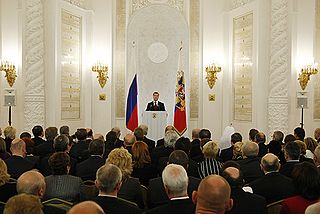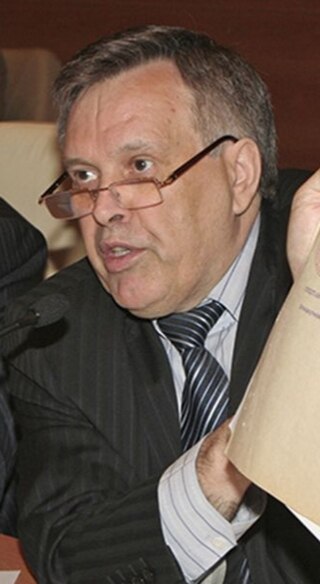
Valentin Sergeyevich Pavlov was a Soviet official who became a Russian banker following the dissolution of the Soviet Union. Born in the city of Moscow, then part of the Russian Soviet Federative Socialist Republic, Pavlov began his political career in the Ministry of Finance in 1959. Later, during the Brezhnev Era, he became head of the Financial Department of the State Planning Committee. Pavlov was appointed to the post of Chairman of the State Committee on Prices during the Gorbachev Era, and later became Minister of Finance in Nikolai Ryzhkov's second government. He went on to succeed Ryzhkov as head of government in the newly established post of Prime Minister of the Soviet Union.

The president of the Soviet Union, officially the president of the Union of Soviet Socialist Republics, abbreviated as president of the USSR, was the head of state of the Union of Soviet Socialist Republics from 15 March 1990 to 25 December 1991.

Nikolai Ivanovich Ryzhkov was a Russian politician. He served as the last chairman of the Council of Ministers of the Soviet Union from 1985 to 1991 and was succeeded by Valentin Pavlov as prime minister. The same year, he lost his seat on the Presidential Council, going on to become Boris Yeltsin's leading opponent in the 1991 presidential election of the Russian Soviet Federative Socialist Republic. He was the last surviving premier of the Soviet Union following the death of Ivan Silayev on 8 February 2023.

Ivan Stepanovich Silayev was a Soviet and Russian politician. He served as Prime Minister of the Soviet Union through the offices of chairman of the Committee on the Operational Management of the Soviet economy and chairman of the Inter-republican Economic Committee. Responsible for overseeing the economy of the Soviet Union during the late Gorbachev era, he was the last head of government of the Soviet Union, succeeding Valentin Pavlov.

Gennady Ivanovich Yanayev was a Soviet politician and disputed President of the Soviet Union for three days. Yanayev's political career spanned the rules of Khrushchev, Brezhnev, Andropov and Chernenko, and culminated during the Gorbachev years. Yanayev was born in Perevoz, Gorky Oblast. After years in local politics, he rose to prominence as Chairman of the All-Union Central Council of Trade Unions, but he also held other lesser posts such as deputy of the Union of Soviet Societies for Friendship and Cultural Relations with Foreign Countries.

Presidential elections were held in the Russian Soviet Federative Socialist Republic (RSFSR) on 12 June 1991. This was the first Russian presidential election in the country's history. The election was held roughly three months after Russians voted in favor of establishing a presidency and holding direct elections in a referendum held in March that year. The result was a victory for Boris Yeltsin, who received 58.6% of the vote.

The annual Presidential Address to the Federal Assembly is a speech given by the Russian President to outline the state and condition in which Russia is in. It is given in front of a joint meeting of the two houses of the Russian Parliament: the State Duma and Federation Council. Article 84 of the current Constitution of Russia enacted in 1993 says "The President of the Russian Federation shall: address the Federal Assembly with annual messages on the situation in the country, on the guidelines of the internal and foreign policy of the State". First Russian President Boris Yeltsin delivered the first Address to the Federal Assembly on 24 February 1994. The date of the presidential address is not fixed.

The Presidential Council was an advisory body to the President of the Soviet Union. It was created on 14 March 1990 to replace the Politburo as the major policymaking body in the USSR. According to article 127 in the Soviet constitution the job of the presidential council was "to implement the basic thrust of USSR's domestic and foreign policy and ensure the country's security", and to present the president policy alternative on social, economic, foreign and defence problems facing the nation, but it lacked a clear mission and had no policymaking authority, and its members were unable to work as a team. In late 1990, Gorbachev invited White House Chief of Staff John H. Sununu to Moscow to advice him on organising the presidential support staff. It was abolished on 26 December 1990. Only the writer Valentin Rasputin was a non-party member.

A referendum on the future of the Soviet Union was held on 17 March 1991 across the Soviet Union. It was the only national referendum in the history of the Soviet Union, although it was boycotted by authorities in six of the fifteen Soviet republics.

The Government of the Union of Soviet Socialist Republics (USSR) was the executive and administrative organ of the highest body of state authority, the All-Union Supreme Soviet. It was formed on 30 December 1922 and abolished on 26 December 1991. The government was headed by a chairman, most commonly referred to as the premier of the Soviet Union, and several deputy chairmen throughout its existence. The Communist Party of the Soviet Union (CPSU), as "The leading and guiding force of Soviet society and the nucleus of its political system" per Article 6 of the state constitution, controlled the government by holding a two-thirds majority in the All-Union Supreme Soviet. The government underwent several name changes throughout its history, and was known as the Council of People's Commissars from 1922 to 1946, the Council of Ministers from 1946 to 1991, the Cabinet of Ministers from January to August 1991 and the Committee on the Operational Management of the National Economy from August to December 1991.

The Congress of People's Deputies of the Soviet Union was the highest body of state authority of the Soviet Union from 1989 to 1991.

Vadim Viktorovich Bakatin was a Russian politician who served as the last chairman of the KGB in 1991. He was the last surviving former chairman of this organization. He was appointed to dismantle the KGB, but he was unable to control this organization and to fulfill the task due to political reasons. However, he was able to fulfill a plan to disintegrate the intelligence agency into separate organizations. He ran for the Russian presidency as an independent candidate in June 1991.

Viktor Ivanovich Ilyukhin was a Russian State Duma deputy, member of the Communist Party of the Russian Federation, Chairman of the State Duma Committee on security, member of the State Duma's anti-corruption committee, member of the State Duma committee to consider of the federal budget on the defense and security of the Russian Federation, and Chairman of the Movement in Support of the Army.

The Union of Soviet Socialist Republics (USSR) was formally dissolved as a sovereign state and subject of international law on 26 December 1991 by Declaration № 142-Н of the Soviet of the Republics of the Supreme Soviet of the Soviet Union. It also brought an end to the Soviet Union's federal government and General Secretary Mikhail Gorbachev's effort to reform the Soviet political and economic system in an attempt to stop a period of political stalemate and economic backslide. The Soviet Union had experienced internal stagnation and ethnic separatism. Although highly centralized until its final years, the country was made up of 15 top-level republics that served as the homelands for different ethnicities. By late 1991, amid a catastrophic political crisis, with several republics already departing the Union and Gorbachev continuing the waning of centralized power, the leaders of three of its founding members, the Russian, Belorussian, and Ukrainian SSRs, declared that the Soviet Union no longer existed. Eight more republics joined their declaration shortly thereafter. Gorbachev resigned on 25 December 1991 and what was left of the Soviet parliament voted to dissolve the union the following day.

The presidency of Boris Yeltsin began with his first inauguration on 10 July 1991, and ended on 31 December 1999 when he announced his resignation. A referendum held on 17 March 1991 approved the creation of the post of president of Russia; Yeltsin was elected Russia's first president in a presidential election held on 12 June 1991.

The 1991 presidential campaign of Boris Yeltsin, was the successful campaign by then-Chairman of the Supreme Soviet of Russia in Russia's first presidential election. Yeltsin ran as an independent candidate. His running mate was People's Deputy and former soldier Alexander Rutskoy.

The Nikolai Ryzhkov presidential campaign, 1991 was the election campaign of former Soviet Premier Nikolai Ryzhkov in the 1991 Russian presidential election. The nominee of the Communist Party, Ryzhkov was the strongest of several candidates running against frontrunner Boris Yeltsin in the election. Ryzhkov's running mate was Boris Gromov.
The 1991 presidential campaign of Vadim Bakatin was the candidacy of KGB Chairman Vadim Bakatin in the 1991 Russian presidential election.


















